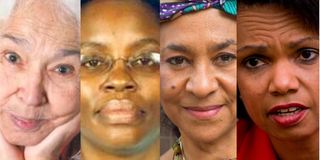Daisy's World: What's on your IWD wishlist? Mine is dinner with these four women

From left: Dr Nawal El Saadawi (died in 2021), Dr Margaret Ogola (died in 2011), Prof Amina Mama and former US Secretary of State Condoleezza Rice.
What you need to know:
- When you are raised by a father who swears by the written word like I was, it means you may read about some dazzling women long before you can appreciate the magnitude of what they are celebrated for.
- And so on this IWD, if I had my way, I would have a table of five for dinner at the Zen Gardens, Nairobi.
If resources, access and time were not an issue, who, dead or alive, would you like to invite for dinner this International Women’s Day?
Every time I hear conversations about the power of authentic female connections, I realise that I have been insanely lucky with the women with whom I have crossed paths professionally and personally.
That is why I feel somewhat guilty to still have a wishlist of more women I would like to meet. But hey, the more the merrier, right?
Icons
When you are raised by a father who swears by the written word like I was, it means you may read about some dazzling women long before you can appreciate the magnitude of what they are celebrated for.
Some names became soundtracks from my childhood, names that stuck with me until I was old enough to understand and discover them for myself. And when I did, it made sense why my father wanted me to know about these women.
And so on this IWD, if I had my way, I would have a table of five for dinner at the Zen Gardens, Nairobi, with the following women from around the world. Let me know who is your favourite, or who your addition would be.
Condoleezza Rice: How did you stay focused amid all the criticisms?
No Surprises in the fact that I would like her on my IWD dinner table. I am a deep admirer of Condoleezza Rice, the first female African American US Secretary of States. I first heard about her from my dad.
As you can imagine, the name sounded like a sing-song, but I knew she had to be significant for my dad to talk about her often. In my late teens when I started watching her interviews on YouTube, I was hooked by her poise, by her courage, by the way she spoke, her opinions about faith and discrimination, and her early professional achievements.
Also read: Lessons I have learnt from Condoleezza Rice
One of my favourite lines of hers was in an interview where she was asked if people ever treat her in a bad way because of her gender.
Her response stuck with me to date: “If by the time you are Secretary of State someone still treats you badly because you are a woman, then it’s your fault and not theirs.”
That line reminded me that being female does not make me a victim.
Margaret Ogola: Who inspired the character of Amor Lore?
Like Condoleezza Rice, I first heard about Margaret Ogola from my dad – as he went on and on about The River and the Source, Ogola’s seminal novel about four generations of women whose daring triumphs rewrite the traditional roles of women.
When I eventually read the book when I was 17 (I started hearing about it when I was 12), I became a big fan.
Also read: Margaret Ogola’s literary spirit lives on
Later in my East African prose class, I came across another book by Margaret Ogola called Place of Destiny. Like The River and the Source, this book has a powerful female character called Amor, who has just four months to live because of advanced cancer, when we meet her in the book.
Amor is a solid mentor, whose presence, love and guidance changed the lives of women not just at her work place but in her family as well.
Prof Amina Mama: When is it ethical to study Africa?
I was introduced to Prof Amina through her paper that problematised how scholars study Africa: Is it ethical to study Africa? Preliminary thoughts on scholarship and freedom.
Drawing the reader’s attention to the fact that the study of Africa, set against the reality of issues such as colonialism, globalisation, the African intellectual traditions and so on, begs the question of: What considerations should be made in the methodologies of studying Africa?
In other words, if we apply methodologies that are not contextually tailored to the continent, we will perpetually have flawed or unsatisfactory scholarship outcomes.
And so for dinner this evening, I would like to hear from her what she sees as the roadblocks in the quest for this, and what implementation looks like in contexts where such considerations are applied.
Nawal El Saadawi: Did you plan to school Zeinab Badawi on BBC’s Hardtalk in 2018?
I have been fascinated by Dr Saadawi – who was a leading feminist in the Arab world. My first brush with her was when I came across one of her books, with a somewhat strange title: Woman at Point Zero.
I wanted to know what point zero is for women and so I read that book.
In the interview, when Badawi asked if there is more democracy in Egypt now compared to back in the day when Nawal was exiled, the good doctor responded by giving an extensive feedback about why there are no democratic elections anywhere in the world.
“Do you think Trump was elected democratically?” Nawal posed in the interview and my brain was like “Yoooooooh!”
If I sat with her over dinner today, I would want to know what it takes to be that forthright.
Happy International Women’s Day! May your wishlist for the day inspire you to include and empower others!
The writer is the Research & Impact Editor, NMG ([email protected]).





